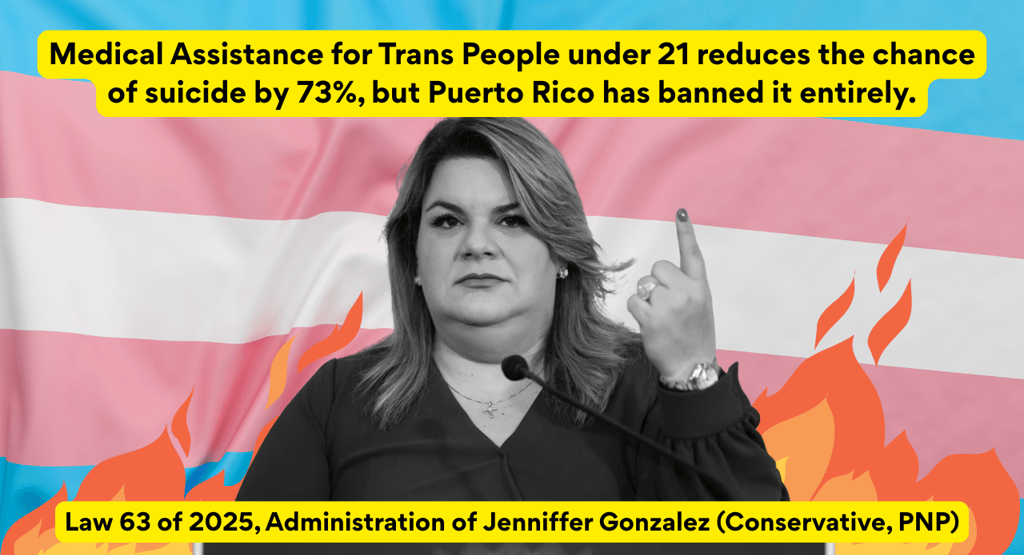Puerto Rico Bans Gender-Affirming Surgery & Hormone Therapy for Those Under 21
Although there is no history of a minor undergoing trans bottom-surgery in the entire history of Puerto Rico, the law also prohibits therapies that are largely reversible and therapies that lower or eliminate suicide rates. Puerto Rico has passed Act 63 of 2025, which prohibits hormone therapy, puberty blockers, and any gender-reaffirming surgery for those under the age of 21.
POLITICSTODAYS NEWSCULTURELIFESTYLE & HEALTH
7/17/20253 min read


The Law for the Protection of the Health and Well-being of Minors (Act 63 of 2025) in Puerto Rico was signed on July 17th, 2025 by Governor Jenniffer Gonzalez (Conservative, PNP) and increases suicide rates in trans people under 21 by 73%. Any medical professional providing gender-affirming care will be penalized with up to 15 years in prison, a $500,000 fine, and have their medical licenses and permits revoked. The law also prohibits public funds to be used for any care of trans-people of any age. The law, despite its misleading name, does not protect youth at all and actually has deadly effects.
Puerto Rico Bans Gender-Affirming Surgery & Hormone Therapy for Those Under 21
Statistics on Puberty Blockers or Hormone Therapy (HRT):
60% reduction in moderate/severe depression.
73% reduction in suicidality or self‑harm ideation.
Suicidal ideation dropped from 81% lifetime to 39% follow‑up
Suicide attempts reduced from 16% to 4%; non‑suicidal self‑injury dropped from 52% to 18%
Over 70% of youth who begin hormone therapy before age 18 continue it 4+ years later—with higher retention than adults.
Regret following medical transition is rare: under 1% in all studies that follow trans adolescents into adulthood.
The law still allows intersex infants to undergo irreversible “normalization” surgeries without their consent which leads to harm and higher suicide rates in adolescence and adulthood often surpassing even LGBTQ+ peers.
"Trans" Bottom Surgeries for those under 17 are virtually non-existent:
In the most recent studies, an average of 85 minors a year, aged 17 and under received “gender-affirming” surgeries. Of those 85 surgeries, 96.4% were chest (top) surgeries, and nearly all were on cisgender boys (97%) for conditions like gynecomastia, not for transgender-related transition. Nearly all surgeries, labeled "gender-affirming" by insurance providers, for minors are actually chest procedures performed on cisgender minors for non-transgender related medical issues. Bottom surgeries performed on those under 18, done in extreme cases after several years of therapy, many medical tests and evaluations, still need consent from both guardians, and are virtually non-existent.
The Takeaway
The vast majority of chest-related surgeries, considered gender-affirming by insurance providers, in minors are for cisgender boys with conditions like gynecomastia, not trans youth. Bottom surgery for minors is illegal in 24-states and even in legal states, requires consent by both parents and is virtually non-existent.
In a free society, people should have the right to live as who they are, without government interference, as long as they are not hurting others. No one ‘becomes trans’ because it’s trendy. People are just finally safe enough to say who they are.
Medical data has always been consistent that gender-affirming care via Hormone Therapy and Puberty Blockers saves many young lives. Hormone Therapy and Puberty Blockers are also largely reversible and have a "regret rate" of less than 1% in all studies that followed trans-people from their therapies starting in adolescence to adulthood. Gender dysphoria is a recognized medical condition. Treatment is backed by decades of research and major medical organizations.
The Jenniffer González administration seems intent on mimicking Trump-style legislation, pushing forward laws that ignore science, human rights, and the lived realities of vulnerable communities. Puerto Rico's younger generations is embracing more progressive values, and the fact is that most voters on the island no longer support the party she represents, the law does not reflect the future most Puerto Ricans are fighting for. It’s a dangerous step backward, and it must be met with truth, empathy, and collective resistance.
